Welcome to Talking Back to Walden. This is where we consider only the best passages of Thoreau’s 1854 classic, for what they might tell us about our present-day environmental woes and hopes. Last month exposed the true source of warmth in Thoreau’s woodpile: the stored energy of the sun. This month’s focus blew in on a gale March 10, with winds of 20 to 30 mph, gusting to 55 mph (88.5 kph). The winds downed trees and closed bridges and the Washington Monument for a time.1
As a child, I was terrified by wind. That ancient fear will always lurk deep, but I took up sailing in my 30s in part as unconscious immersion therapy. I’ve had some wild experiences with wind, including a full-on epiphany where I was shown a brief glimpse of the oneness of all.2 Today, let’s explore our relationship with wind, starting with Thoreau, then continuing with a stormy story and two wise teachers: David Abram and Lauren Groff.
From Chapter 5: Solitude
In this chapter, Thoreau refers to wind no fewer than eight times. Wind carries a whippoorwill’s song, stirs night creatures into action, and acts as a feature of winter and evidence of Nature’s “innocence and beneficence.” Wind is as much a part of Walden Woods as the rain, the pond, the snow, the animals. But only to set a scene in Thoreau’s drama while he explores the lake or shelters snug in his cabin. Wind is not afforded the status of a character.
Wind does ripple, blow, roar, howl, and “sigh humanely,” but only as a force in the background. Thoreau keeps wind at arm’s length, separate from his imaginative relations with a wide range of other inhabitants of the place. It’s curious that he doesn’t indulge more curiosity about the sheer otherness and agency of wind, the very breath of our earth-body.
The transcript is at the end, if you prefer to read it.
Talking Back
Our boat spins on her keel to scream northward up the Chesapeake Bay—back the way we had just spent the last sixteen hours sailing and motoring. In the blackness, we can see nothing. Not land, not a navigation buoy, not a container ship nor another boat.
“Why did you tack?” I yell over the roar of the storm, my body brittle with terror.
“I didn’t,” my husband yells back. “I’m just going with the wind.”
It’s late June, the time when summer slips from friendly warmth to demanding heat and humidity. We had been motoring south from the Magothy River with the aim of reaching the James River by morning.
I was on first watch, the 10-to-2 shift, with our friend M, Windspiel’s owner since the 1970s. The boat is a sturdy, blue-water Bristol-34 who has spent most of her life in the creeks and rivers of the Chesapeake Bay, a place notorious for sudden summer storms of breathtaking violence. Windspiel runs on a simple tractor engine but with her advanced age, seldom a weeklong cruise passes without incident. Something always breaks.
M had been at the helm while I picked out pinpoint flashes of light from navigation buoys, noted the colors, counted the seconds between flashes, and consulted the chart to track our location in the prehistoric darkness. In those days without GPS, that was how you navigated at night.
All was inky swirl ahead. At about 1:00 a.m., I saw lightning flash. It seemed far off, but who could tell? In all that darkness, the horizon is a rumor.
Later we would learn that M was in the early stages of dementia. He also enjoyed rum on ice starting about mid-afternoon and continuing until after dinner. Still, he’d taken Windspiel to Nantucket and Charleston on many occasions. He’d circumnavigated the Eastern Shore of Maryland for fun a couple times. He’s by far the most experienced sailor of our five-person crew. I asked him to check the weather radio and trusted his report that there were no storms forecast. Without smart phones, we had no weather radar apps.
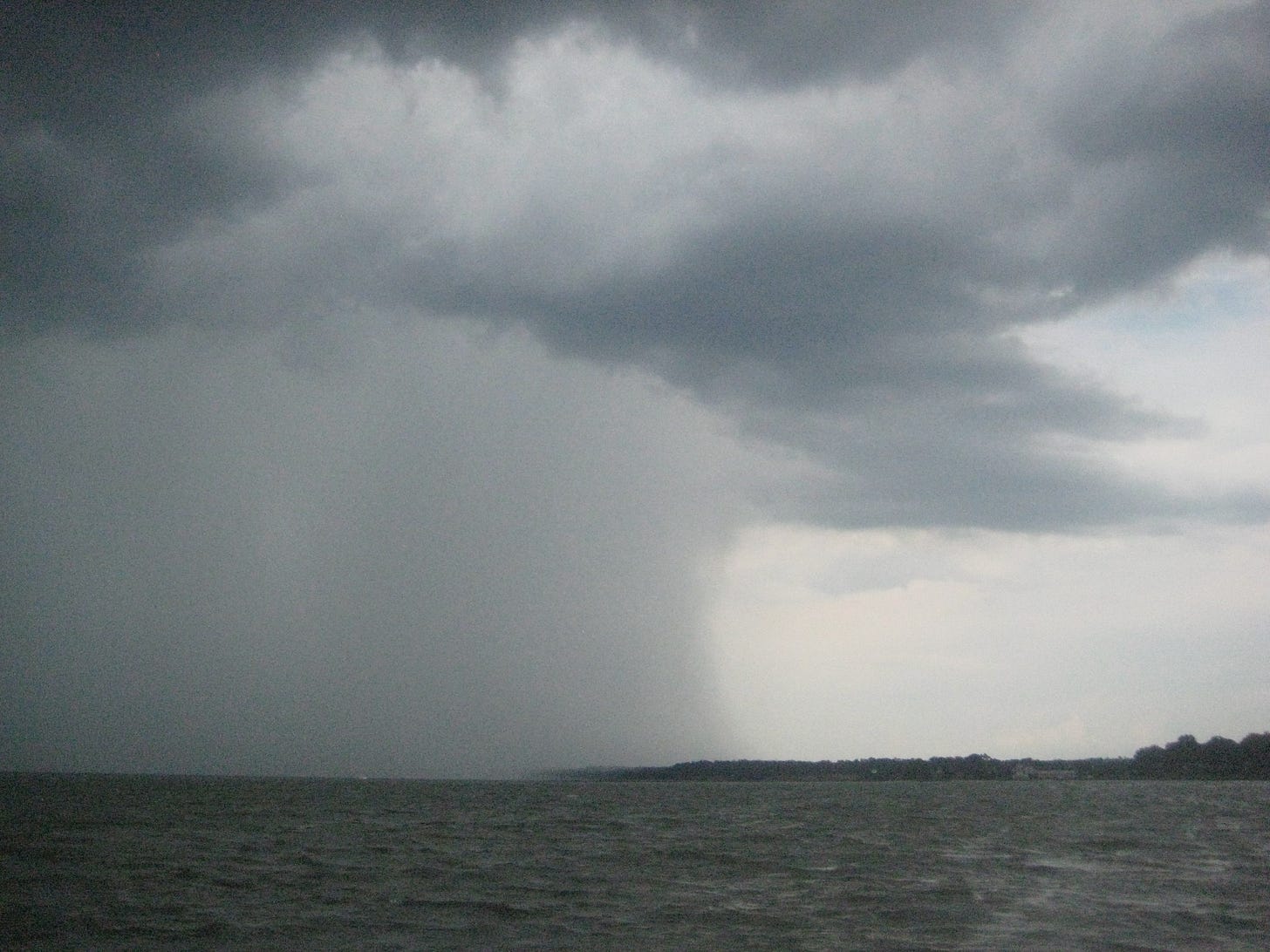
By the time I spotted the lightning, we’d been running south for hours just off the western shore between the Patuxent River and the Potomac—a stretch of inhospitable cliffs with few safe harbors. As we approached the final indentation along that featureless coast, the calm night ruffled with a building breeze, so M and I formulated a hasty Plan B. We turned towards the poorly marked cove seeking the hurricane hole on its far side. When it began to rain, the wind and waves picked up, so I scrambled below to wake my husband. Our nine-year-old son T and his best friend R slept on amidships.
Peter steps into foul weather gear and climbs up into the cockpit. We brief him on the plan, which he hates instantly. As if on cue, the engine starts racing and moaning like a breathless marathoner. Now, we have no choice but to kill it and sail in the dark of night into a tiny unfamiliar inlet, guided only by unilluminated daymarks. The swell of the water renders these invisible half the time—a sure recipe for running aground. Or hitting one. Or both.
During our debate, the storm eases. By unanimous decision and because Peter has taken the helm, we sail back out to open water to continue our original course southward.
As soon as we clear the cove, the storm breaks anew in a deluge of rain and wind. Adrenaline floods my body, rubberizes my limbs, and desiccates my mouth. Rain collects in my hat brim so fast that I can tip my head down and drink from the waterfall.
Chaos below. The boys’ cards, games and clothes are strewn about the cabin sole and mixed afresh each time the waves toss the boat. They are awake and having a ball, treating the motion and wet as an theme park ride. My one job is to keep them below, so I position my body in the companionway. Relieved to have something, anything, to do.
I can’t stop the replay of the sweet curbside moment when R’s mother dropped him off and hugged us, saying, “He’s going to have a wonderful time.” I should have recognized the cheap foreshadowing. I push away the lurid imagined newspaper headlines and do the one thing I can think of to manage my runaway mind, the relentless reptile brain that feeds on fear. I supplicate to the storm: I see you and, yes, I am impressed. But now you’re showing off. Your power is awesome; you don’t need to throw quite so much of it at us, I get it. I’m afraid, give me a break, please. We are helpless before you. We bow down. My shaky inner voice cannot conceal the desperate sarcasm of the condemned.
The storm’s too occupied with tossing us about to reply, so I move on to reciting poetry. Rilke and Frost and Rumi and Hafiz—anyone I can think of. This also has no effect on the storm, but it does calm me. Marie Howe’s “Annunciation” is particularly good for situations like this.
I also vow never to be in another situation like this. (Which holds for a few years until the next thrashing.)
All my senses immersed, animal body engulfed by wind, by smell and taste of rain, chill on soaked skin, tension in muscles, screech of rigging, whine of wheel, hull slam shouldering quick waves slopping over bow, Bay water running to stern to return to source.
I stand on the companionway threshold between the wind’s fury and the boys’ eager chaos, gripping the jamb so hard my fingers are numb. My husband holds fast to the wheel. Normally self-assertive, he gives himself wholly and unquestioningly to the storm. He sails into the blind darkness for as long as it takes. A reverence born of necessity and humility and blind faith.
We emerge from the calm dawn to limp into a marina on the Rappahannock River. We locate a mechanic who can work on our air-choked fuel lines. In celebration of being spit out once again by the mighty Chesapeake, I sit with M on a dockside bench and drink rum on ice for breakfast. The wind has gone, leaving rising heat and humidity in its wake. The boys go off in search of a swimming pool.
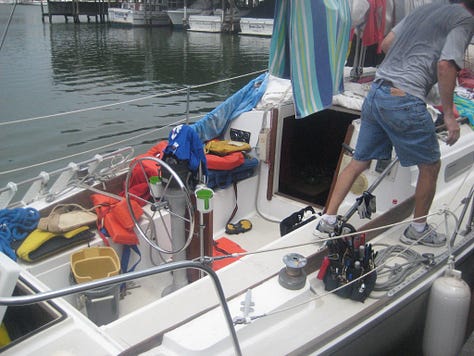
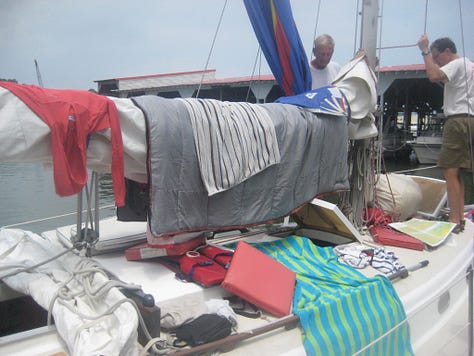
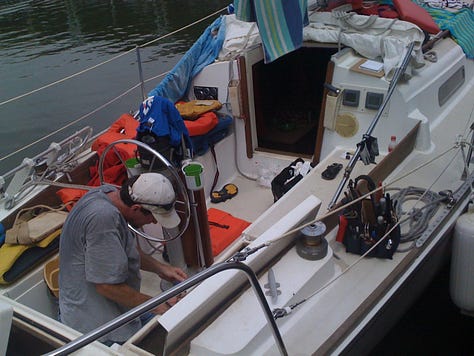
Immersion
David Abram’s marvelous essay, “The Air Aware,” dives into the emotional and sensory effects of attunement to a place, to its phenomena and its consciousness. He demonstrates that we relate to the atmosphere and land around us as animals, whether we are aware of that or not. He also shows that our language is sourced from this interconnection with the elements, and that matter is spirit—the two are indivisible.3
“The unruly poltergeist of our collective mental climate, wind, after all, is the ancient and ever-present source of the words spirit and psyche. It is the sacred ruach of the ancient Hebrews (the invisible “rushing-spirit” that lends its life to the visible world); it is the Latin anima, the soulful wind that animates all breathing beings (all animals); it is the Navajo Nilch’i (the Holy Wind from whence all earthly entities draw their awareness).”
Your invitation
Walk or sit outside in the same place every day for three days (or one day, or a week). Notice the wind. How does it feel on your skin, in your hair? How does it affect your breath? How does it smell? How does the wind act on the others around you: trees, flowers, birds, other animals? What is their relationship to the wind? How does the wind affect your mood or stir emotions or memories?
Abram asks, “Are we not simply projecting our own interior mood upon the outer landscape?” What’s your response to this, before and after your encounters with the wind? And/or reading his essay?
Measure
The climate crisis has wrought more ferocious storms, deeper droughts, wildfires on unprecedented scale, flooding, heat waves, political unrest, and migration of climate refuges. How has it affected wind? Like all things climate change, it’s complicated.
In 2022, Jim Robbins of Yale360 reported on “global stilling”—aka “wind drought”—a trend dating back to the late 1970s that had a brief respite for about ten years before resuming in 2021. Wind is caused by uneven temperatures, and since the arctic is warming alarmingly faster than the rest of Earth, the difference between highs and lows is shrinking. It appears that wind is involved in, well, everything:
“As carbon dioxide levels rise and the Earth’s poles warm, researchers are predicting a decline in the planet’s wind speeds. This ‘stilling’ could impact wind energy production and plant growth and might even affect the Gulf Stream, which drives much of the world’s climate.”
With data going back only 70 years, wind is a new area of study in climate science. And there’s so much variability from one year to the next that it’s nearly impossible to discern patterns of variability over the long term. The article enumerates several striking examples of how wind patterns worldwide affect the growth, reproduction, distribution, health, and evolution of plants. For instance, giant sequoias in the U.S. rely on a regular delivery of phosphorous carried from the Gobi Desert across the Pacific Ocean. Wind also aids in liftoff for those giant airbuses and drives the turbines we’re relying on to clean up our energy production.4
This is a screenshot of a very cool animated wind map of the U.S. When I looked, there was a mean-looking vortex between Denver and Dallas that just might be the mythic town of Charybdis, Kansas.5
In case you think like I do, yes, there is a global one, and here it is (below). You can drag and drop it and zoom in to look anywhere on Earth. It sure was windy in the North Atlantic when I looked, whew. Wouldn’t want to be out there in a 34-foot sailboat.

I just had an amusing thought—as distractable as Thoreau is with his sidetracks and digressions into classical literature, world cultures, history and anthropology, can you imagine him in the face of the juggernaut that is the Internet? What if Thoreau had an Instagram account?
A single search for articles on the topic of wind and climate change has overwhelmed me with gloomy, contradictory information (hence the wind maps). I will close with this one referencing the August 2021 IPCC report, which called wind the next overlooked warning sign in the climate crisis. As if we don’t already have enough of those.6
Wisdom
I just finished Lauren Groff’s recent book, The Vaster Wilds. It’s a marvel, with her signature disciplined realism of character, setting, voice and language. The plot is somehow both linear and spiraled, with every reveal perfectly placed and inevitable. The final chapters are a triumph of imagination. I can’t think of another writer who is better at shifting from exquisite or horrifying local detail to surprising, incontestable cosmic truth in the same moment. The final paragraph convinced me that wind would be this month’s theme. No persuasion necessary.
“The wind passed, even as it is passing now, over all the people who find themselves so dulled by the concerns of their own bodies and their own hungers that they cannot stop for a moment to feel its goodness as it brushes against them. And feel it now, so soft, so eternal, this wind against your good and living skin.”
Talking back to Walden together
Last month, in the subscriber chat, you shared messages from the sun. Low-angled light throws tree shadows across new snow. Leafless trees glow ochre in full winter sun. When the sun feels cold in a winter-blue sky. A cat basks in a patch of sun on a rug. The joy of sharing a cold sunrise on the beach with your dog. A hopeful view of sunlit mountains from an airplane. When the sun brings neighbors outside in a perpetually cloudy city, just to marvel.
Thanks to
and for sharing your gorgeous photos and stories.This month let’s share our wild windy experiences. It’s March, after all! Maybe the prompt questions in the Immersion section above will help guide your encounters. Subscribers can follow this link to the chat and share away.
Transcript of excerpt from Chapter 5: Solitude
This is a delicious evening, when the whole body is one sense, and imbibes delight through every pore. I go and come with a strange liberty in Nature, a part of herself. As I walk along the stony shore of the pond in my shirt sleeves, though it is cool as well as cloudy and windy, and I see nothing special to attract me, all the elements are unusually congenial to me. The bullfrogs trump to usher in the night, and the note of the whippoorwill is borne on the rippling wind from over the water. Sympathy with the fluttering alder and poplar leaves almost takes away my breath; yet, like the lake, my serenity is rippled but not ruffled. These small waves raised by the evening wind are as remote from storm as the smooth reflecting surface. Though it is now dark, the wind still blows and roars in the wood, the waves still dash, and some creatures lull the rest with their notes. The repose is never complete. The wildest animals do not repose, but seek their prey now; the fox, and skunk, and rabbit, now roam the fields and woods without fear. They are Nature’s watchmen,—links which connect the days of animated life.
. . . I have a great deal of company in my house; especially in the morning, when nobody calls. Let me suggest a few comparisons, that some one may convey an idea of my situation. I am no more lonely than the loon in the pond that laughs so loud, or than Walden Pond itself. What company has that lonely lake, I pray? And yet it has not the blue devils, but the blue angels in it, in the azure tint of its waters. The sun is alone, except in thick weather, when there sometimes appear to be two, but one is a mock sun. God is alone,—but the devil, he is far from being alone; he sees a great deal of company; he is legion. I am no more lonely than a single mullein or dandelion in a pasture, or a bean leaf, or sorrel, or a horse-fly, or a humble-bee. I am no more lonely than the Mill Brook, or a weathercock, or the north star, or the south wind, or an April shower, or a January thaw, or the first spider in a new house.
I have occasional visits in the long winter evenings, when the snow falls fast and the wind howls in the wood, from an old settler and original proprietor, who is reported to have dug Walden Pond, and stoned it, and fringed it with pine woods; who tells me stories of old time and of new eternity; and between us we manage to pass a cheerful evening with social mirth and pleasant views of things, even without apples or cider,—a most wise and humorous friend, whom I love much, who keeps himself more secret than ever did Goffe or Whalley; and though he is thought to be dead, none can show where he is buried. An elderly dame, too, dwells in my neighborhood, invisible to most persons, in whose odorous herb garden I love to stroll sometimes, gathering simples and listening to her fables; for she has a genius of unequalled fertility, and her memory runs back farther than mythology, and she can tell me the original of every fable, and on what fact every one is founded, for the incidents occurred when she was young. A ruddy and lusty old dame, who delights in all weathers and seasons, and is likely to outlive all her children yet. The indescribable innocence and beneficence of Nature,—of sun and wind and rain, of summer and winter,—such health, such cheer, they afford forever! and such sympathy have they ever with our race, that all Nature would be affected, and the sun’s brightness fade, and the winds would sigh humanely, and the clouds rain tears, and the woods shed their leaves and put on mourning in midsummer, if any man should ever for a just cause grieve. Shall I not have intelligence with the earth? Am I not partly leaves and vegetable mould myself?
Thanks for reading Talking Back to Walden. Read previous months here: September, October, November, December, January, February
If you enjoyed this, please share. For more like it and for my regular weekly posts, please consider becoming a free or upgrading to paid subscriber.
Another way to show love is to share this post with others by restacking it on Notes, via the Substack app. Thanks!
I highly recommending reading “The Air Aware,” by David Abram in its entirety, available on Orion’s website.
The wind map contains this charming disclaimer: “The wind map is a personal art project, not associated with any company. We've done our best to make this as accurate as possible, but can't make any guarantees about the correctness of the data or our software. Please do not use the map or its data to fly a plane, sail a boat, or fight wildfires :-)”
https://www.greenmatters.com/p/climate-change-wind-patterns





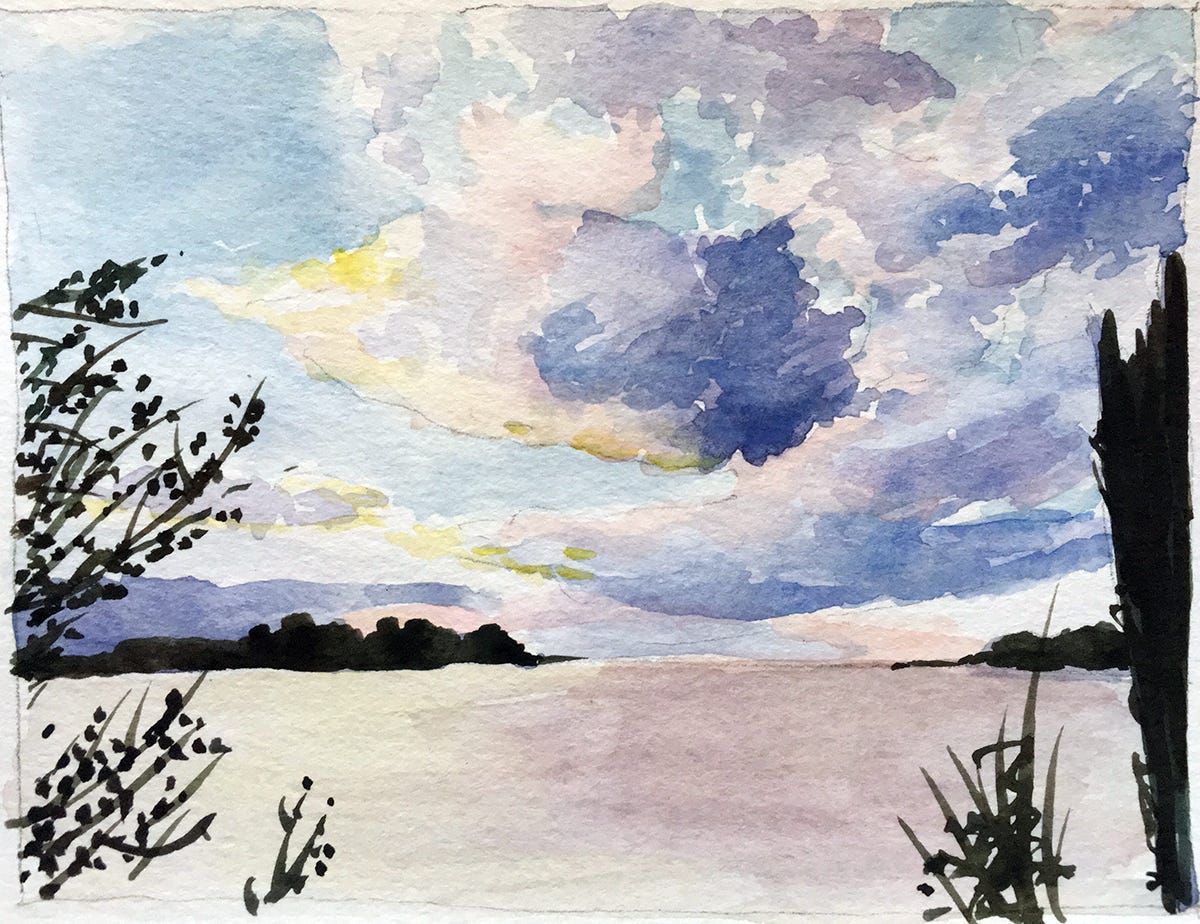

Very timely, as we’re under a “fire watch wind advisory” tomorrow. Your Chesapeake adventure(s) with storm(s) is terrifying just reading about—glad you all made it through safely!
My wind story is from Fall, 1983. Mike & Lauren had come out to Seattle for Kyle’s baptism the weekend after Thanksgiving. We had a terrific storm on Thanksgiving that knocked out the power. I can still see Lauren standing at our dining room glass door watching the trees in the woods behind us as they bent and twisted—she was very worried that one (or more!) might fall on the house. Fortunately, none did, the power came back on the next day, and we had Thanksgiving one day late.
Julie,Julie, Julie! You evoked such fond memories of sailing on the Chesapeake that I now must go back and reread the rest of your post that I somehow skimmed over.
I only have one small quibble: I was taught that gentlemen never tack into the wind. Sure, the practice might cause occasional navigation challenges, but a gentleman always has enough leisure to do things properly.